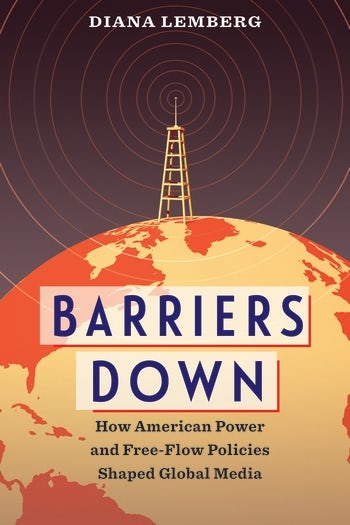Columbia University Press has published Barriers Down: How American Power and Free-Flow Policies Shaped Global Media, by Diana Lemberg (Lingnan University, Hong Kong). A description from the Press:
Freedom of information is a principle commonly associated with the United States’ First Amendment traditions or digital-era technology boosters. Barriers Down reveals its unexpected origins in political, economic, and cultural battles over analog media in the mid-twentieth century. Diana Lemberg traces how the United States shaped media around the world after 1945 under the banner of the “free flow of information,” showing how the push for global media access acted as a vehicle for American power.
Barriers Down considers debates over civil liberties and censorship in Nazi Germany, the Soviet Union, and elsewhere alongside Americans’ efforts to circumvent foreign regulatory systems in the quest to expand markets and bring their ideas to new publics. Lemberg shows how in the decades following the Second World War American free-flow policies reshaped the world’s information landscape, though not always as intended. Through burgeoning information diplomacy and development aid, Washington diffused new media ranging from television and satellite broadcasting to global English. But these actions also spurred overseas actors to articulate alternative understandings of information freedom and of how information flows might be regulated. Bridging the historiographies of the United States in the world, human rights, decolonization and development, and media and technology, Barriers Down excavates the analog roots of digital-age debates over the politics and ethics of transnational information flows.
Excerpts from advance reviews:
Barriers Down refutes the cliché that "information wants to be free." Instead, Lemberg details how the notion of barrier-free flow of information was contested in the late twentieth century and how a group of predominantly American diplomats, business leaders, and scholars secured its freedom. It is both timely and historically wise. David Engerman
Historians of U.S. global power have been curiously disinterested in the history of the media. In this wide-ranging and thought-provoking book, Diana Lemberg steps into the breach, reminding us just how many intellectuals, politicians, and diplomats spent the Cold War arguing about the future of global communications. Sam Lebovic
